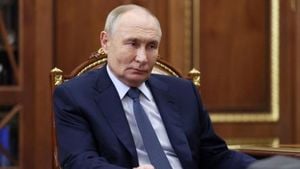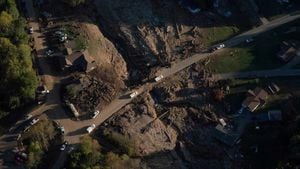After spending 235 days aboard the International Space Station (ISS), Colorado astronaut Matthew Dominick has returned to Earth, bringing with him not just memories of his mission but also the complex adjustments he faces reintegrated back to life on solid ground. Originally hailing from Wheat Ridge, Dominick was the commander of NASA’s SpaceX Crew-8 mission which launched on March 3, 2024. The prolonged stay — two months longer than originally planned — was filled with scientific experimentation and personal discovery.
Upon his return, Dominick shared insights about the remarkable experience of living and working in microgravity and how it affects the human body and psyche. During his extended space mission, he was involved in various projects, each contributing to our knowledge of space and improving life on Earth. From experiments measuring muscle atrophy to studying fluid mechanics, he was at the forefront of scientific exploration.
One significant aspect of his mission was observing the physiological changes experienced by astronauts. The lack of gravity leads to muscle weakening and bone density loss, requiring astronauts to consistently work out to maintain their physical health. "It’s absolutely fascinating, but it’s also challenging. You come back, and your body feels like it’s been through the wringer," Dominick noted. He emphasized the importance of exercise equipment onboard, mentioning how it plays a pivotal role not only physically but also mentally.
After returning to Earth, astronauts frequently experience disorientation and readjustment difficulties. This phenomenon, often referred to as "space adaptation syndrome," can include dizziness, fatigue, and changes to vision. "It’s like your body forgets how to simply walk and stand without assistance after months of floating around," he explained during his initial interviews post-mission.
Dominick detailed his initial struggles to readjust to earthly life, highlighting how simple activities, like walking or bending, felt foreign after extended microgravity exposure. He candidly described how he sometimes felt overwhelmed by sensations he hadn’t experienced for months. The Universal Translation Effect, as he calls it (affectionately), left him with the sensation of everything heavier and gravity more forceful than he'd remembered.
To ease this transition, he shared recommendations for future astronauts about the importance of mental health and support when they return from missions. "We really need to focus on psychological well-being – it’s just as important as the physical side. Astronauts need support, even when they come home,” he advised, pointing out how colleagues had also echoed similar sentiments. Dominick’s words stress the importance of maintaining mental clarity and emotional stability after returning from such extraordinary experiences.
NASA and its partners are continually refining the strategies to support astronauts during their readjustments. Learning from past experiences of astronauts, the agency has focused on enhanced rehabilitation programs, which include physical training and psychological support, to help them tackle post-mission challenges. Dominick emphasized the longevity of the experience, advising, "It’s about more than just getting back on your feet; it’s about finding ways to adjust mentally and physically to the world again. It can take time, as surprising as it is to some."
Meanwhile, the mission itself was not solely about Dominick’s individual experience. The Crew-8 mission contributed immensely to scientific advancements. Research focused on everything from agricultural innovations — studying how plants grow without gravity — to advanced materials, which could positively impact production methods here on Earth.
The mission’s successful reunification of science and discovery showcases a bright future for human endeavors beyond our planet. Matthew’s mission has reinvigorated attention on the significance of human spaceflight. This, alongside NASA’s ambitions for Mars exploration, highlights the importance of preparing astronauts for long-duration missions.
Looking forward, Dominick remains engaged with the scientific community. He aims to speak publicly about his experiences, highlighting not only the marvels of space exploration but also the necessity of preparation before and after such missions. "We’re all part of this larger narrative of exploration, and my experience is just one chapter. There’s so much more to learn, and every astronaut counts," he elaborated.
For now, as he settles back home with his family and friends, Dominick appreciates the comforts of earthly life, including the simple pleasure of solid ground underfoot — something many take for granted. Daily life may seem mundane to some, but for him, every step is now imbued with depths of meaning shaped by his experiences above the clouds. His story serves as both inspiration and reminder of the incredible resilience of the human spirit, both above and below the stars.
Matthew Dominick's reflections invite everyone to ponder our collective curiosity about space and the astonishing feats achievable when humanity pushes the boundaries of what we believe is possible. Who knows what the next chapter will be as humanity's reach expands beyond our world?



